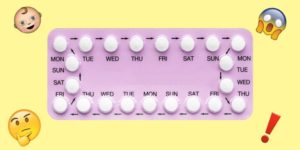This is what to do if you miss a contraceptive pill, based on which one you take
2017-07-19
And how to prevent it spelling p-r-e-g-n-a-n-c-y
Most of us are busy women with busy lives, which means sometimes we can forget to take our contraceptive pill at the same time each day. But if you’re not planning on procreating just yet, a missed pill could be a big deal.
So what happens if you do forget? Does it mean automatic pregnancy and a foreseeable future filled with nappies and breast milk? Don’t panic just yet; we spoke to those in the contraception-know at Clue, the period tracker app, who explained exactly what steps to take dependent on your kind of pill.
They told us there are two main types of pill: the ‘combined pill’ and the ‘mini-pill’, and for those of us who aren’t doctors by profession and therefore need those terms clarifying, here’s the difference between them both:
The combined pill:
Combined oral contraceptives (COCs) include both hormones oestrogen and progestin. The most common types of combined pill in the UK include Microgynon, Cilest, Rigevidon and Yasmin.
The mini-pill:
Progestin-only pills (POCs) include only progestin. Some of the most common mini-pills given out by the NHS include Femulen, Micronor, Norgeston and Noriday.
What to do if you forget to take a combined pill
If it’s been less than 3 hours:
A pill taken within three hours of scheduled time is considered on-time. The pill is fully effective.
If it’s been 3-24 hours:
A pill taken 3-24 hours past scheduled time is considered late. Take your pill as soon as you remember, even if it means taking two pills in one day. Taking your pill late on a regular basis is not recommended. Emergency contraception is not usually needed, but may be considered if pills were missed earlier in the cycle or in pills 15-21 of the previous cycle. Talk to your healthcare provider if you’re concerned.
If it’s been 24-48 hours:
A pill taken 24-48 hours after scheduled time is considered missed. Take the missed pill as soon as possible, even if it means taking two pills in one day. As before, emergency contraception is not usually needed, but may be considered if pills were missed earlier in the cycle or in pills 15-21 of the previous cycle. Again, if you’re concerned, it’s worth talking to a nurse or a doctor.
It’s been more than 48 hours:
If you’ve missed two or more pills, take the most recent missed pill as soon as possible. Take your pill as soon as you remember, even if it means taking two pills in one day. Do not take more than two pills in one day – you can throw away extra missed pills.
If you miss a pill, it’s recommended that you should use a backup method of contraception such as condoms for the next seven days, while proceeding to take the remaining pills in your pack on time.
What to do if you forget to take the mini-pill
A mini-pill taken within three hours outside of the scheduled time is considered late (or 12 hours for desogestrel pills, such as Cerazette). If you are late taking a pill, you should take it as soon as you remember.
A mini-pill taken more than three hours after scheduled time is considered missed (or 12 hours for desogestrel pills). If you’ve missed a pill, you should take it as soon as you remember, even if that means taking two pills in one day. Do not take more than two pills in one day.
You will also need to use a backup method of contraception (eg. condoms) for the next 48 hours. You are not considered protected from pregnancy until you have taken your pills correctly for at least two days.
Emergency contraception is usually recommended if you had unprotected sex after missing your pill, and before you’ve taken your pill correctly for at least two days.
Hopefully that’s provided some useful information for you, but it’s worth remembering these guidelines from Clue do not replace the advice of a doctor – this information is based on the contraceptive recommendations of the World Health Organisation and the Centres for Disease Control and Prevention.


